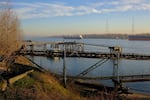UPDATE (Feb. 27, 6:13 p.m. PST) — The long-proposed Vancouver Energy oil terminal project officially died Tuesday.
Vancouver, Washington, port commissioners made it official by unanimously voting to cancel the lease.
After nearly five years of debating whether to build the nation’s largest oil-by-rail terminal in Vancouver, the port and Vancouver Energy agreed to end their lease.
The $210 million project, a joint venture from Tesoro and Savage, would have brought up to 360,000 barrels of crude oil a day on trains traveling along the Columbia River.
The decision came a month before a March 31 deadline set by the port that required Vancouver Energy to obtain all of the necessary permits for the project.
Related: How A Grassroots Effort In Vancouver Fought Big Oil — And Won
Port CEO Julianna Marler told commissioners that Vancouver Energy approached the port on Friday with a proposal to end the lease early.
“From the port’s perspective, this gives us the ability to market the property that’s currently under the lease and provides us an earlier opportunity to look at other potential tenants for that site,” Marler told the commissioners at Tuesday’s meeting.
Port of Vancouver Communications Manager Abbi Russell said the port has already narrowed down a couple of businesses that have expressed interest in Terminal 5. She says the additional acreage and rail access freed up by Vancouver Energy’s departure will only provide more opportunities for the port moving forward.
Vancouver Energy General Manager Jared Larrabee told port commissioners on Tuesday that the company will donate $100,000 set aside for next month’s rent to charities in southwest Washington. In partnership with the Community Foundation for Southwest Washington, the funds will be released in the form of grants to local organizations.
“Our focus really at this point in time is making sure we’re concluding this in a way that’s positive for the community,” Larrabee told OPB. “And that we’re ending this on a high note.”
The decision comes after a series of setbacks for the terminal project. In late November, Washington's Energy Facility Site Evaluation Council, or EFSEC, unanimously decided to recommend against building the terminal in Vancouver. Then in January, Gov. Jay Inslee rejected a key permit to build the facility, essentially ending its chances unless the developers appealed that decision.
Under state law, EFSEC is supposed to make a decision on energy projects within a year. But in the case of the Vancouver Energy oil terminal, Washington’s energy board has been considering the project since 2013 — a point of frustration for Vancouver Energy stakeholders, Larrabee said.
“We think that it’s actually incumbent upon stakeholders in the state of Washington to really look at how to improve and streamline siting energy facilities in the state,” he said. He added that the terminal’s outcome will have a chilling effect on future business in the state.
“This will change how all businesses and all industrial projects, whether it’s energy or not, look at business in the state of Washington,” Larrabee said.

The dock at the Port of Vancouver where the proposed Vancouver Energy terminal project would move oil onto ships and tankers bound for West Coast refineries.
Conrad Wilson / OPB
Washington’s business community has been a strong supporter of the project, saying it would bring much-needed jobs and revenue to southwest Washington. Vancouver Energy promised 300 construction jobs in the short term and another 200 jobs once the terminal was up and running.
“We worked for almost a decade to get a privately funded industry project here,” said Lee Newgent, the former executive secretary of the Washington State Building and Construction Trades Council. “And then we just stop supporting it? Driving these businesses away without having an alternative is a shallow way of looking at industry.”
The project struggled in part because of a sustained grassroots organizing effort that regularly turned out people in opposition to the fossil fuel project. Environmentalists and groups who have long-opposed the project celebrated Tuesday's decision.
“What this means is that communities can stand up and they can protect themselves from destructive projects like the Vancouver Energy project,” said Michael Lang, the conservation director for the nonprofit Friends of the Columbia Gorge and a member of the Stand Up To Oil Coalition.
Vancouver Energy’s decision to end the lease willingly also signaled that they would not be pursuing further litigation, something many feared would drag the issue into the courts for what could have been years.
“It’s an indication that they’ve really thrown in the towel,” said Earthjustice attorney Kristen Boyles. “It’s a huge lift to an idea about communities really being able to speak for themselves and determine what they want to see in their future.”